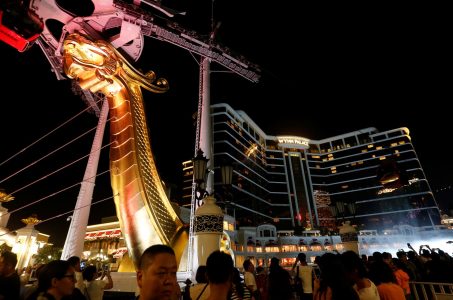Las Vegas Sands Bond Sale Tagged With BBB- Mark, Fitch Says Macau Concession Risk Prevents Higher Rating
Posted on: November 21, 2019, 10:44h.
Last updated on: November 21, 2019, 12:23h.
Las Vegas Sands Corp. (NYSE:LVS) said Thursday it’s selling an unspecified amount of debt, which earned a BBB- grade with a “positive” outlook from Fitch Ratings.

The BBB- mark is the research firm’s lowest in investment-grade territory. In July, the operator of five Macau casinos sold $3.5 billion worth of corporate bonds in its first sale with high-grade ratings from the three major debt evaluation firms. Sands is the only major domestic gaming company with investment-grade ratings from each of Fitch, Moody’s Investor’s Service, and Standard & Poor’s (S&P).
LVS said it will reveal the new issue’s principle amounts and interest rates when the offering prices. The company expects to use the proceeds for “general corporate purchases,” including share buybacks. Sands’ July debt offering was conducted in three tranches, with maturity dates of 2024, 2026 and 2029, with interest rates of 3.2 percent, 3.5 percent and 3.9 percent, respectively.
LVS has operated well within Fitch’s upgrade leverage ratio sensitivities for an extended period of time, driving the Positive Outlook,” said Fitch Ratings in a note out Thursday.
The ratings agency says the primary factor preventing it from boosting LVS’ grade to BBB is Macau concession risk.
Speaking Of Sands’ Macau Operations…
Fitch’s reluctance to take LVS up to BBB, which would lower the interest rate the company has to offer buyers of its debt, is interesting because the the research firm has previously acknowledged, Macau concession risk for the operator is remote.
“Fitch believes that the risk of the concession not being extended is very remote,” said the ratings firm. “A more plausible risk is LVS being subject to onerous extension terms, such as a higher tax, a concession payment, or a call by the government for significant lower ROI investments.”
Sands operates five gaming properties on the peninsula, including the Sands Macao, Parisian Macao, and Venetian Macao. All six gaming licenses there expire in 2022, and it is expected that the renewal conversation will gain steam next year following the installation of a new government administration in December.
In the third quarter, Sands generated $3.25 billion in revenue, with its Macau properties combining for $2.11 billion of that sum.
Bullish On Japan
Although some LVS executives recently expressed concerns about the costs of building a first-class integrated resort in Japan, Fitch believes the operator is well-positioned to handle the tab for constructing a gaming property in the world’s third-largest economy.
“Also driving the Outlook is Fitch’s increased confidence that LVS can absorb a large scale development, such as a Japan integrated resort (IR), without material long-term deterioration in the leverage credit metrics or liquidity strain,” said the ratings agency.
On the company’s third-quarter earnings conference call, COO Rob Goldstein said LVS could spend $10 billion to $12 billion for a Japanese venue, while CFO Patrick Dumont noted the final tally could be even higher.
“LVS is in a good position to bid on an IR license in Japan, but Fitch does not expect heavy capex spending in Japan to occur until 2022 at the earliest,” according to the research firm.
Related News Articles
Hard Rock International Not Done Trying to Roll in Hokkaido
Macau Casino Stocks Rally as Some Travel Restrictions Ease
Most Popular
Mirage Las Vegas Demolition to Start Next Week, Atrium a Goner
Where All the Mirage Relics Will Go
Most Commented
-
Bally’s Facing Five Months of Daily Demolition for Chicago Casino
— June 18, 2024 — 12 Comments -
Chicago Pension Mess Highlights Need for Bally’s Casino
— July 2, 2024 — 5 Comments
















No comments yet